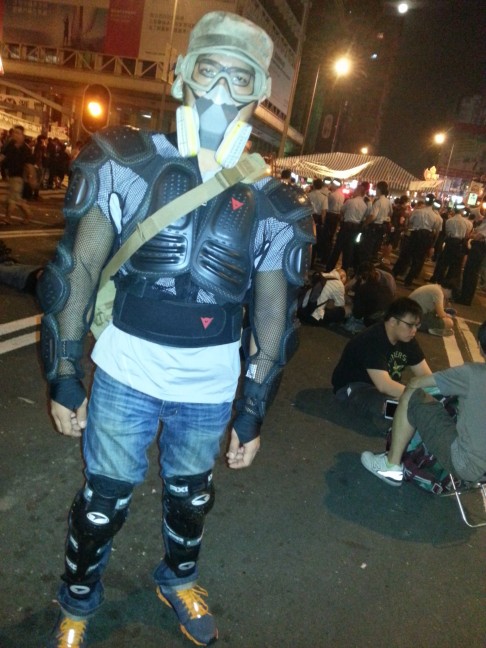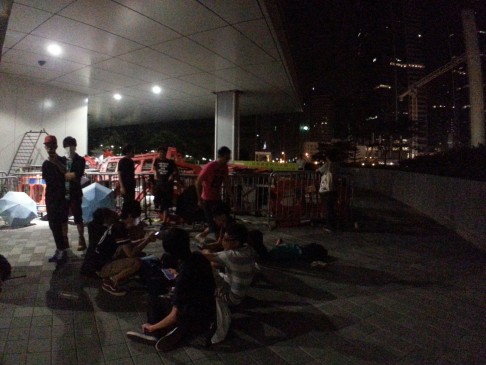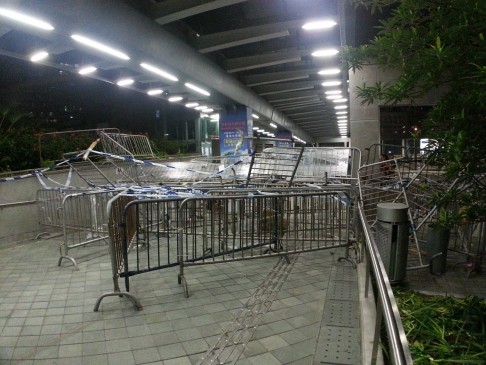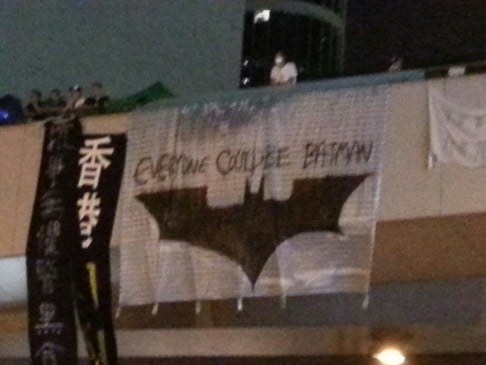Live | OCCUPY CENTRAL - NIGHT EIGHT: Full coverage of the night's events
A relatively quiet night last night, which saw the first glimmers of possible dialogue between protesters and the government emerge. The two sides, however, remain deadlocked over the terms of the formal meeting, so no firm progress yet.
Good morning and welcome to our continuing 24-hour Occupy Central coverage.
6.45am: Occupy supporters who have spent the night outside wake to the first working day of the week. About 300 people remained at Mong Kok, and tensions remained low with occasional conversations and songs heard throughout the evening.
In Causeway Bay, 19-year-old form six student Mo Lau-tzar is returning to the classroom after a week of no school.

"I think it's time for me to go back to school and inform the teachers of the war that has been going on, and what we have done," he says. "I am also a DSE student sitting a public examination next year so I cannot afford to miss another class.
"I'll insist on coming back here every day after school. This [protest] goes beyond my expectations, seeing Hongkongers outside on the streets united. We are so determined to [achieve] universal suffrage."
Admiralty is also waking up, with demonstrators making loudspeaker announcements thanking supporters and asking those who are leaving to arrange their friends to take their places.
The MTR said in a statement this morning that it would be operating peak period frequency from around 7.15am today as it anticipates patronage levels would be higher than a normal weekday, due to the overnight protesters and commuters returning to work.
The MTR also said that train services would be enhanced throughout the day if necessary, adding that passengers should start off earlier and allow more time to travel.
Members of the public should not take their children or family members to child care centres, elderly services centres or day rehabilitation units as traffic has been affected by protests at various locations in Kowloon and on Hong Kong Island, the Social Welfare Department said in an announcement.
These centres will still remain open to serve those whose families cannot provide alternative care, however.
5.40am: As Hong Kong wakes for the beginning of a new week, dawn shines on a three-metre statue of a person holding an umbrella.
Similar to the Goddess of Democracy, the statue was erected in Tamar, and the man who made it said that he was inspired by a picture of an Occupy protester holding an umbrella for an officer under the rain.
"That picture is very meaningful. I aspire for freedom and peace, and that picture has shown that," the man said, who only gave his name as Milk.
"It means that we care about everyone, even if 'everyone' is the police force."
He said he and about 10 of his friends spent several days making the statue, which was constructed of hundreds of small wooden boards. The statue does not have a name, nor is it specifically male or female.

4:50am: In Beijing, online state media issued two signed commentaries late last night on the Occupy Central movement. The articles, both penned under the name “Guoping”, were published on the People’s Daily website and the State Council Information Office’s affiliated news portal.
One of the commentaries alleges that campaigners of the Occupy movement have been using “populism” to mobilise young people.
“Hong Kong is 7 million Hong Kongers’ Hong Kong, and more so, 1.3 billion Chinese’s Hong Kong,” the commentary reads. “The Central Government and all countrymen’s attitude and stance [on Hong Kong's 2017 Chief Executive election] are unprecedentedly unanimous and not to be shaken.”
In the other commentary, "Guoping" criticised “street politics” and said that whoever governs Hong Kong in the future must be “loyal to the state and Hong Kong”.
3.40am: While dawn is still hours away, there's one Sun working under the moonlight.
Timothy Sun, 17, was seen picking up rubbish around the Harcourt Rd area around 3am, using a pair of tongs and garbage bags he had brought himself.

"Cleaning up is one of my habits because I like tidy things," the Canada-born Hongkonger said.
He has stayed overnight in Admiralty cleaning the streets every night, bar one, since the protests began more than a week ago.
Sun said he continued to support the campaign because he believed police had overreacted by using tear gas and pepper spray last Sunday. The fight for universal suffrage has also energised him.
"We have the right to vote for our chief executive," he said while picking up cigarette butts and other litter.

3am: The demonstration sites have mostly turned quiet, with police keeping their distance. In Causeway Bay, around 150 demonstrators have camped out overnight, with the majority remaining chatty and few sleeping early.
Admiralty and Mong Kok also remain peaceful, a stark contrast to the tear gas and scuffles that occurred at both sites earlier this week. A police cleanup of both areas seems unlikely at this hour.
Currently, a few hundred people remain at the Mong Kok sit-in, while one protester who identified himself only as Jacky to a Post reporter showed up in fully decked-out combat gear to "support the students".

2.10am: As of an hour ago, it seems possible for civil servants to resume work in Admiralty's Central Government Office tomorrow - with a bit of a squeeze into one of the two paths left open by protesters.
At the moment, a small passage about three people wide leading to the government building remains open on the footbridge from Admiralty Centre, while another path from the Citic tower footbridge has been completely blocked off by metal barricades and is being guarded by protesters.


One of the guards who insisted on blocking the passage told the Post that they could not stop the Hong Kong Federation of Students from opening a passage tomorrow for civil servants to go to work.
Some 3,000 people work in the government office complex.
1.40am: By midnight a few thousand people have gathered along Harcourt Road in Admiralty, with a laidback atmosphere pervading the air with no sign of tension nor significant police presence to be found.
A short burst of applause erupted from the crowd after a new sign was lowered from a nearby overpass, bearing the Batman symbol and the words: "Everyone could be Batman."

This is not the first time a superhero has been invoked as inspirational imagery for Occupy Central - previously in Admiralty, demonstrators dressed as Captain America.
Meanwhile, the majority of the signs in Causeway Bay have reflected appeals for democracy and peace, quoting speeches from noteworthy people such as Gandhi and John Lennon. Some signs, however, are highly charged statements regarding the United States involvement in Syria.
It's worth noting that anyone can come up to the protest camp in Causeway Bay and write their own messages.

12.45pm: About an hour ago, Federation of Students deputy secretary-general Lester Shum told media that he and other federation members had just had a meeting with the undersecretary for constitutional affairs Lau Kong-wah, political assistant Ronald Chan Ngok-pang and another administrative official.
“The officials did not agree with our three principles. We will have to meet again to discuss this before entering into formal talks,” Shum said.
The meeting was to prepare for negotiations with Chief Secretary Carrie Lam Cheng Yuet-ngor and Secretary for Justice Rimsky Yuen, he said.
While officials agreed to maintain an open attitude and respect the students, Shum said they would not agree with three principles: that the talks have to be multiple rounds instead of a single round; that both sides were equal; and that the government would “execute” the outcome of future negotiations.
“We hope the talks will not be merely a chat or a consultation. Our sole purpose is to solve the problem over political reform,” he added.
Shum, speaking at the University of Hong Kong campus, would not reveal the location of the meeting as officials asked them to not disclose where they met.
11.50pm: Over 80 academics from all eight universities in Hong Kong have released a statement urging the government to respond to the appeal of students with concrete and substantive action.
"We are opposed to the use of brutal force on our people, whose pure intention is to seek rational dialogue with the government," the statement reads.
"If indeed the authorities are to go down the path of brutal suppression, not only will the current political stalemate continue, but it will also trigger futher escalation of conflicts in this community and bring about more rigorous counter-action."
Baptist University School of Journalism's To Yiu-ming, who signed the statement, said the government should at least show the public a time frame for the discussion between Occupy supporters and Chief Secretary Carrie Lam Cheng Yuet-ngor.
When asked whether he believed students should retreat, he said: "As a teacher, of course I worry about their safety, but I respect their decisions. I am sure every decision they made has been meditated."

11.13pm: It's all quiet on the Kowloon protest front. In Mong Kok, the atmosphere is generally calm, with about 2,000 people and onlookers, according to a Post reporter's estimate. Hundreds of uniformed and plainclothes officers are stationed on the west and east of the camp, and say they will only intervene if there is a commotion.
There were even a few new arrivals, spurred on by the departure of some 20 volunteers who called for the Mong Kok outpost to be abandoned with protesters relocating to Admiralty. "The fact that they asked people to leave has prompted more people to come out," James Wong, in his 20s, said.
"If everyone squeezes into Admiralty, it will be very easy for police to clear the protest," he said.
11pm: It doesn't look like negotiations will begin any time soon. Adding to earlier comments, Alex Chow, from the Federation of Students, said the government was still deciding who should be sent to the meeting with protesters, and where to hold the dialogue.
"It seems there are spilt opinions among the government. CY Leung has been rather tough against [a dialogue], but there are other officials who seem willing to talk," Chow said.
In the meantime, Occupy will dig in its heels. "Occupy must go on to give pressure to the government, as it is why they are willing to talk to us in the first place," he said. "Now, whether a dialogue can proceed depends on the sincerity of the government."
But he said: "We want the dialogue to begin as soon as possible. It is best [if a] time table can be set by tomorrow. "
10.47pm: Amid anxious speculation about the next move of police this evening, an HKU academic has slammed the Hong Kong police force's recent claims that tear gas had a limited effect on the human body.
Ronnie Poon Tung-ping, a clinical professor at HKU's medical school, branded claims that CS gas was harmless, and equivalent to using pepper spray, as "a lie or ignorance".
Poon warned in a post on his Facebook page that tear gas could result in injuries or induce even acute lung problems that lead to sever hypoxia (where a region of the body is deprived of oxygen), he said.
“I am very surprised that the police force who are in possession of potentially lethal or harmful weapons seem to have no knowledge of the possible harms of these weapons,” the professor wrote.
10.35pm: Another public statement: former Chief Executive Tung Chee-hwa has joined a chorus of public figures, across the political spectrum, calling on the students (he calls them "future chief executives") to evacuate. Police haven't given a clear indication if they plan to clear the streets tonight, but it seems to remain a nagging concern.
Occupy students and young friends, we’ve heard your call for democracy clearly. We understand your persistence.
Street actions often lead to unexpected complications, which not only will affect your studies and careers, but also endanger your safety. Occupy is now in its eighth day and the situation is getting more and more complicated. Like many parents and teachers, I have been worried about students’ safety every day. I call on you, evacuate from the protest areas as soon as possible for your owns safety.
Hong Kong is a diverse society. You have made a great sacrifice, giving up everything else and joining the occupation movement for democracy. But the foundation of democracy is rule of law and abiding the law. And dialogue and communication is is the way to resolve over different views in a diverse civil society.
Students are the future of Hong Kong. Some of them will be Hong Kong’s Chief Executive(s) in the future. I believe that you not only have ideals and persistence, but also have courage and wisdom. I call on you to show them and to understand different views positively and peacefully, to have good exchanges [of opinions], and to seek a consensus with a vision that belongs to a civil society. Work with all Hong Kong people with your utmost effort to build Hong Kong’s future
10.05pm: Federation of Students secretary-general Alex Chow Yong-kang tells the crowd in Admiralty that they have started “preparations” for talks with Chief Secretary Carrie Lam Cheng Yuet-ngor.
While Chow noted that the police said they allocated adequate manpower to maintain public order and prevent clashes, "we still have to observe if the government is willing to take up the responsibility of maintaining public order in occupied areas”.
He says the police guard fulfilled the federation’s prerequisite (guaranteeing safety for everyone, including detractors) for the dialogue.
Chow stressed that the federation's preparation did not signal a compromise, but that they had to work out details such as the dialogue format with Lam's representatives. The federation will not back down on its demands for civil nomination and the abolition of functional constituencies.
At this stage, “we will not be discussing the political reform yet,” he said. If the government "does not enforce the law impartially" and if it launches a violent clearance of protesters, the preparation will be suspended, Chow said.
9.43pm: A former Hong Kong chief justice has urged protesters to "use words rather than limbs" in fighting for democracy, as he warned all parties against using violence.
Yang Ti-liang said: “The string of protests in Kowloon and Hong Kong Island in the past few days have done harm to all sides. I feel that it is time everyone to think of ways to persuade each other and seek a solution with a cool head, tolerance and open-mindedness.
“The voice of the protesters, heard in Hong Kong and in different parts of the world, has made an impact. I think that if protesters can fight for their demands using language and words, rather than limbs, it will be more effective.”
“I call on everyone, whether they are young people or other residents, for restraint and mutual understanding of each other. Do not let violent actions damage your careers and studies, and even your personal safety.”
9.37pm: Protesters outside the government HQ are grumbling about the auxiliary policeman turned Occupy protester who announced a retreat from Lung Wo Road earlier. Joe Yeung, a history major at Shue Yan University, was pictured shaking hands with a police representative after the supposed retreat was announced, prompting demonstrators in other parts of Admiralty to rush to defend the road.
Some protesters were heard wondering if Yeung was a "police spy". But Ronny Tse Kin-pong, who has known Yeung for two years, refuted this.
"He has been supporting the students since last week, when the students stormed Civic Square. When police fired tear gas last week, he was at the forefront. He was tear-gassed but still, he was there the entire night," Tse said.
Tse said Yeung "loathes the police's political stance" and wants to quit his job as an auxiliary policeman. "He wanted to quit for a while but he did not have the time because he has been here supporting the Occupy movements," said Tse, who recently graduated from the university's English department.
9.06pm: People Power party chairwoman Erica Yuen Mi-ming urged more protesters to occupy Queensway, which connects Wan Chai to Central, as it is the “most at risk of a [possible] police clearance tonight”.
Protesters on Queensway will be vulnerable to arrest if their ranks remain thin, Yuen said.
"The government has already announced that [classes] will resume in Central and Wan Chai, which means they are confident Queensway will be cleared by tomorrow morning,” Yuen said. But "all will be safe if there are plenty of people [on the road tonight]."
Meanwhile, another member of People Power, a “radical” pan-democratic party which holds two seats in Legco, is urging all pan-democrats to “paralyse” the legislature when the new session resumes on Wednesday, if Chief Executive Leung Chun-ying and Police Commissioner Andy Tsang Wai-hung refuse to resign.
“What Leung Chun-ying did over the past week has shown that he is determined to destroy the core values of Hong Kong," said legislator Chan Chi-chuen.
Chan urged the other 25 pan-democrat lawmakers to filibuster on all budgets and bills, and to deny pro-establishment lawmakers’ membership in two key committees dealing with manpower and public works, where pan-democrats hold a majority. Chan said an independent committee of judiciary officials should be set up to investigate the police's use of tear gas to disperse unarmed protesters last Sunday.
8.48pm: Though crowds have noticeably dwindled in Causeway Bay, protesters say they have no plans to leave. Some 200 people, according to a Post reporter's estimate, remain camped out in front of the Sogo department store. Many stores are open, but there are only a few shoppers.
"We will leave when the last person leaves," said Philip Tsang, 34, one of the volunteers who have been keeping the base running in the absence of any Occupy of Federation of Students representatives.
"There's no leader here. Each one of us has an opinion" and we don't plan to vote on the next step, Tsang said.
8.37pm: Strange turn of events in Admiralty as a move to un-occupy Lung Wo Road, near CY Leung's office, turns out to be short-lived. The decision, said to have been voted on by the crowds, was sealed with a handshake between a young protester and a police representative.
But hundreds of angry protesters quickly re-occupied the road. The protester who gave the handshake, Joe Yeung, is an auxiliary police officer who has been joining the protests for several days.
Yeung's friend, Yuen Chi-kui, who joined him in the demonstrations, said: "Since the start of Scholarism's campaign late last month, [Joe] has decided to come and support the protesters. He will quit the police post soon."
8.15pm: An earlier call by a group of 20 volunteers to pack up the Mong Kok protest zone and hightail it to Admiralty hasn't had its intended effect.
The crowds have mostly stayed put, and new volunteers have stepped in to replace the ones who left. Many were unmoved by the 20 volunteers' call to leave for safety reasons.
8pm: Police said the government was planning to have classes resume in primary schools and kindergartens in the Central and Western districts tomorrow, but warned parents that there could still be traffic disruptions.
“We hope parents will be prepared that it will take a great deal more time than usual for their kids to go to school on Monday,” Lee Kwok-chung, senior superintendent of the police traffic branch, said in a news conference today.
Lee said that if Queensway in Admiralty remained blockaded, school buses heading to Caine Road or the Mid-Levels must take roads in Wan Chai or Sai Ying Pun, such as Kennedy Road and Western Street. These alternative routes could take 30 minutes to 50 minutes, Lee said.
A total of 2.9 kilometres of road are closed today due to the democracy protests, up from yesterday’s 2.8km after other Mong Kok street closures.
Meanwhile, police also said there were 20 cases of ambulances being delayed in the Central and Western districts, Causeway Bay, Mong Kok and Tsim Sha Tsui. They arrived at the scene a few more minutes later than the 12-minute service pledge, according to deputy chief fire officer Joseph Leung Wai-hung.
No fire engines were delayed in those areas.
7.55pm: Despite the government's calls for a dialogue, Alex Chow, secretary general of the Hong Kong Federation of Students, reiterated today that talks would be impossible unless the government could guarantee everyone's safety, including angry groups who seek to stop Occupy Central.
"Recently we’ve seen some deliberate attempts to interfere [with Occupy], especially in Mong Kok where [some came] to create chaos," Chow said. "The government has to promise that the incident happened in Mong Kok would not happen again and only by doing so can any dialogue be launched in a peaceful way, and this is the consensus of all the activists."
He said activists feared that the government was using a carrot and stick approach to suppress the movement.
He also slammed the government for providing "false information" to the public that access to the government headquarters in Admiralty had been blocked.
Amid speculation that police might be sent in to clear protest zones, Chow reiterated that everyone must leave if rubber bullets or a higher degree of force is used to disperse the crowds. "We would like to remind all people here to be careful of their personal safety because this is the first priority," he said, adding that protesters should reassemble somewhere else where it is safe.
There have been mounting calls for the protesters to leave the streets - for their own safety, and not necessarily for surrender - but it is unclear how protesters will respond. Here's what public figures and officials are saying today:
Andrew Li Kwok-nang, former Chief Justice: "No one would like to see the students getting hurt. I sincerely urge the students to leave immediately. Otherwise there is a danger to their safety"
Henry Tang Ying-yen, former chief secretary: ""I call on students and other protesters to withdraw immediately to ensure their personal safety. The best solution to problems is dialogue, not stand-off."
Law Chi-kwong, Democratic Party member and University of Hong Kong scholar: "Public support is the most important thing for any social movement. With prolonged actions, public support will dwindle, which is not good for the whole movement."
Professor Francis Chan Ka-leung, head of Chinese University's medical school: “To leave here at this moment does not mean failure or giving up. We have a long way to go. I hope students can put their own safety as the top priority.”
Professor Peter Mathieson, HKU vice-chancellor: "If you stay, there is a risk to your safety. Please leave now: you owe it to your loved ones to put your safety above all considerations."
Professor Leonard Cheng Kwok-hon, president of Lingnan University: "Several indications have pointed to the high possibility that the situation will become very dire in the next 12 hours. I urge all students and staff to leave all protest areas immediately for their safety and not make your families worried."
Joseph Jao-yiu, Chinese University vice-chancellor: "In the past week, the city, the mainland and even the whole world have heard your desire for democracy. We are touched by your sacrifice to the city and your love of Hong Kong. As a teacher, vice-chancellor and a father, I pleaded with you not to commit any unnecessary sacrifice. Please take a step back, which does not mean you give up or fail."

